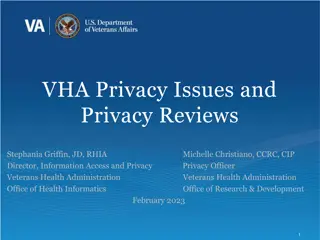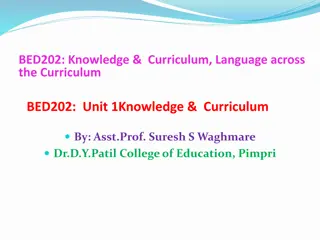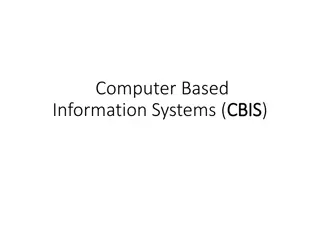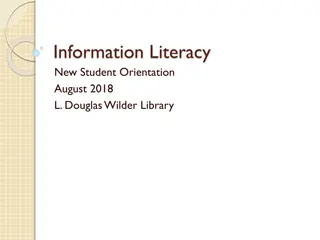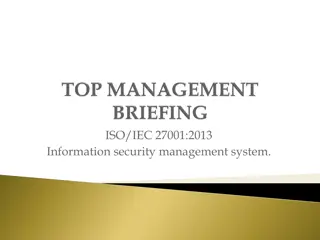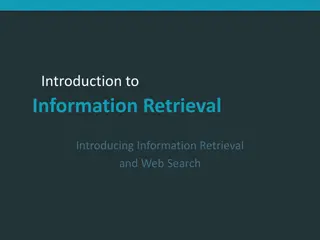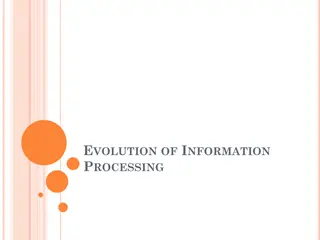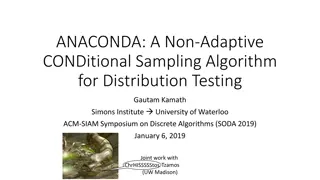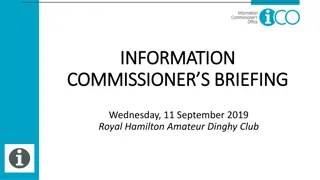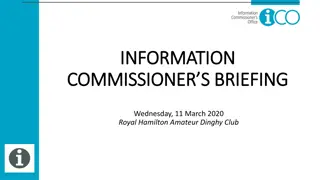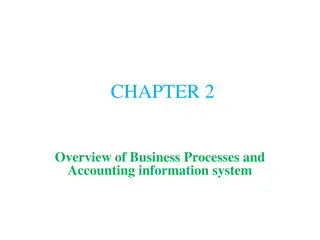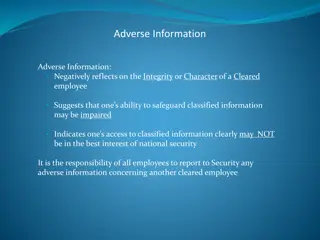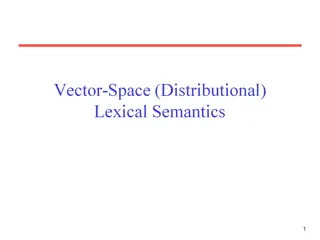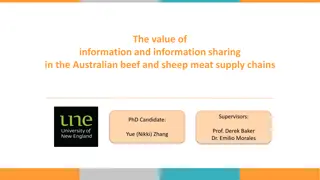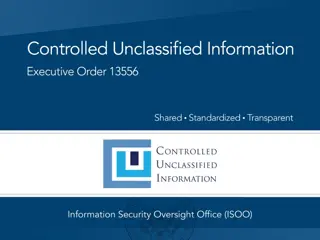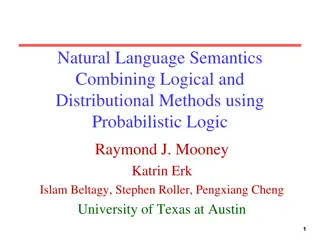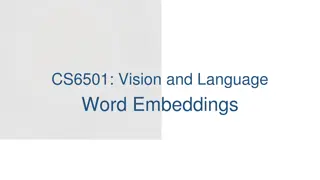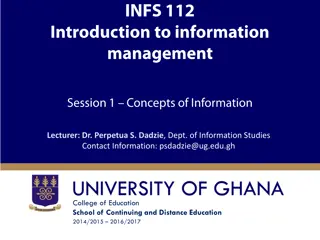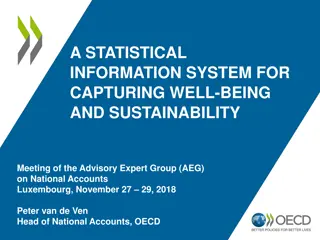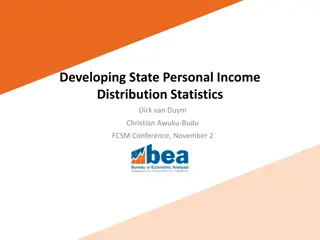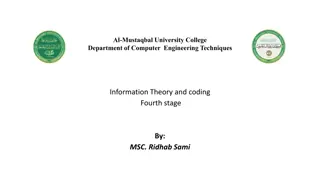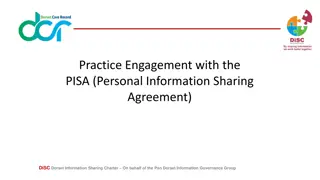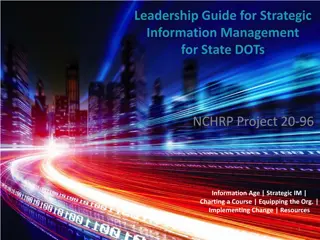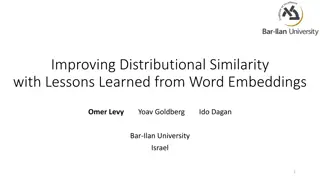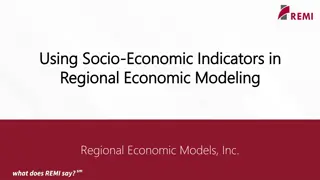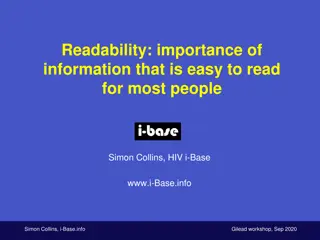Understanding Information Systems in Organizational Management
Management in organizations is divided into three levels: operational, tactical, and strategic. Each level requires different information systems to support various activities. Operational systems focus on routine transactions and control processes, while middle-level systems aid in semi-structured
9 views • 39 slides
Understanding VA Privacy Issues and Sensitive Information
Explore the complex landscape of VA privacy issues, including data relationships, sensitive personal information (SPI), personally identifiable information (PII), individually identifiable information (III), and individually identifiable health information (IIHI). Learn about the roles and responsib
0 views • 29 slides
Understanding Data, Information, Knowledge, and Curriculum in Education
Data is raw facts and figures, information is interpreted data with meaning, and knowledge is the accumulation of facts and information. The nature of knowledge involves acquiring information from real-life experiences and education. This content delves into the distinctions between data, informatio
0 views • 64 slides
Understanding Information Centres: Types and Organization
Modern libraries are evolving into information centres, offering precise information to users. They bridge the gap between user needs and available information. Information centres play a crucial role in providing timely and relevant information, aiding in decision-making and preventing duplication
0 views • 28 slides
Information Sharing Schemes and MARAM for Community Housing Organizations
These slides provide insights on information sharing schemes and the MARAM framework designed for community housing organizations to promote the wellbeing and safety of children, assess family violence risks, and enhance collaboration across service sectors. The Child Information Sharing Scheme (CIS
2 views • 15 slides
Inter-Cluster Coordination and Information Management in Humanitarian Emergencies
Inter-Cluster Coordination and Information Management play vital roles in humanitarian emergencies. The coordination mechanism involves regular meetings convened by the RC/HC and coordinated by OCHA, providing opportunities for clusters to collaborate on shared planning, needs assessments, and poole
3 views • 13 slides
Certification and Training in Information Security
This content covers various aspects of certification and training in the field of information security, including organizational information security outlines, positions in information security personnel, and professional certifications from renowned organizations. It also provides insights into dif
0 views • 18 slides
Understanding Computer-Based Information Systems (CBIS)
Computer-Based Information Systems (CBIS) transform raw data into valuable information to support decision-making, coordination, and control. CBIS utilize computers to collect, process, analyze, and distribute information efficiently. Data is the raw material, while information is the processed data
0 views • 27 slides
Understanding Information Literacy: A Comprehensive Guide for Students
Information literacy is crucial for academic success. It involves the ability to recognize the need for information, locate relevant sources, evaluate their credibility, and effectively use the information for research and presentations. Primary and secondary sources play a vital role in gathering i
0 views • 19 slides
Understanding ISO/IEC 27001:2013 Information Security Management System
Overview of ISO/IEC 27001:2013 standard for information security management system (ISMS). Learn about the importance of protecting information assets, preserving confidentiality, integrity, and availability of information, and steps to certification. Enhance understanding of different types of info
0 views • 35 slides
Introduction to Information Retrieval and Web Search
Information Retrieval (IR) involves finding unstructured material, typically text documents, within large collections stored on computers to satisfy information needs. This process extends beyond web search to include email search, corporate knowledge bases, and legal information retrieval. The text
0 views • 53 slides
Evolution of Information Processing in Computerization
Evolution of information processing from raw data to useful information through computerization. Data is collected, processed, and converted into valuable insights for decision-making. The growth of complexity led to the development of Information Technology, enabling efficient creation, processing,
0 views • 7 slides
Distribution Testing Algorithms for Property and Equivalence Testing
Distributional Property Testing involves determining if a sample satisfies a given property or is from a specific distribution. The ANACONDA algorithm and other methods are used to test for uniformity, identity, and equivalence of distributions in various domains. Results show complexities and chall
2 views • 24 slides
Information Commissioner's Briefing at Royal Hamilton Amateur Dinghy Club
The Information Commissioner's Briefing held at Royal Hamilton Amateur Dinghy Club covered topics related to the Public Access to Information Act in Bermuda. The briefing emphasized the rights of Bermudians and residents to access public records, the role of the Information Commissioner in promoting
0 views • 51 slides
Information Commissioner's Role in Bermuda's Public Access to Information
The Information Commissioner in Bermuda plays a crucial role in promoting public access to information, ensuring compliance with the PATI Act, and safeguarding the right to access public information. This independent office provides guidance to public authorities, oversees enforcement activities, an
0 views • 37 slides
Understanding Business Processes and Accounting Information Systems
This chapter provides an overview of essential business activities, decisions, and information required for organizational operations. It discusses the role of the data processing cycle in organizing activities and supplying information to users. Various types of information needed for decision-maki
0 views • 62 slides
OECD Expert Group on Disparities in National Accounts Work Summary
The OECD Expert Group on Disparities in National Accounts focuses on developing methodology to produce distributional results for household income, consumption, and saving. Their work involves adjusting national accounts totals, identifying relevant variables from micro data sources, imputing missin
0 views • 15 slides
Understanding Adverse Information Reporting in National Security
This detailed content covers the importance of reporting adverse information regarding cleared employees in national security settings. It outlines the impact of adverse information on security clearances, the 13 adjudicative guidelines used in determining eligibility for sensitive duties, NISPOM re
0 views • 15 slides
Understanding Word Meaning through Vector Space Models
Explore how Vector-Space (Distributional) Lexical Semantics represent word meanings as points in a high-dimensional space. Learn about Semantic similarity, creating sample lexical vector spaces, and using word vectors to measure semantic relatedness. Discover how other contextual features and featur
0 views • 33 slides
Enhancing Information Sharing in Australian Meat Supply Chains
This research delves into the value of information and information sharing within the beef and sheep meat supply chains in Australia. It explores the benefits of improved decision-making, reduced costs, and enhanced supply chain performance through strategic information sharing. The study also ident
1 views • 21 slides
Centralized Unified Information Program Overview
The Centralized Unified Information (CUI) Program aims to establish a uniform system for safeguarding and disseminating unclassified information across executive departments and agencies. Executive Order 13556 mandated the program to address the patchwork of policies present, promoting clarity, cons
2 views • 16 slides
Avoco's Cloud-Based Information Card Selector: Enhancing Usability and Security
Avoco's Cloud-Based Information Card Selector is a leap forward in Information Card usability, offering benefits such as universal access to Information Cards, zero footprint for end users, and enhanced security features. The platform allows for easy creation, import, and backup of cards, as well as
0 views • 29 slides
Natural Language Semantics: Combining Logical and Distributional Methods
Explore the integration of logical and distributional methods in natural language semantics, including the use of probabilistic logic, FOPC, Montague Semantics, semantic parsing, and more. Delve into the rich representation of knowledge, semantic compositionality, and the mapping of natural language
0 views • 43 slides
Exploring Word Embeddings in Vision and Language: A Comprehensive Overview
Word embeddings play a crucial role in representing words as compact vectors. This comprehensive overview delves into the concept of word embeddings, discussing approaches like one-hot encoding, histograms of co-occurring words, and more advanced techniques like word2vec. The exploration covers topi
1 views • 20 slides
Understanding Data, Information, and Knowledge in Information Studies
Data, information, and knowledge play vital roles in our lives and are essential in information studies. Dr. Perpetua Dadzie explores the definitions and distinctions among data, information, and knowledge, emphasizing the transformation process that turns raw data into meaningful information. The s
0 views • 23 slides
Understanding the Unequal Impact of Inflation on Different Socioeconomic Groups
Inflation affects different households unevenly, with poorer households experiencing faster price growth due to various factors like innovation and expenditure capabilities. The distributional effects are further influenced by economic recovery, leading to implications on real hourly wage growth and
0 views • 5 slides
Understanding the Role of Classified Information in Criminal Trials
In criminal trials, the handling of classified information is crucial and governed by specific rules. Defendants do not have an inherent right to access classified information, and there are procedures in place to determine its use in court. The rights surrounding secret evidence include protection
0 views • 43 slides
Integrate Climate Change into Nepal's Macro-Structural Model
This model explores the integration of climate change effects into Nepal's macro-structural framework, focusing on impacts such as higher temperatures, changes in rainfall patterns, and extreme weather events. It considers effects on the economy, GHG emissions, transition risks, and policies for mit
0 views • 16 slides
Shifting Focus: Enhancing Well-being and Sustainability through Economic Metrics
Critiquing the limitations of GDP, the presentation explores the importance of incorporating household perspectives, distributional information, and non-market activities to measure well-being and sustainability effectively. Recommendations from the Stiglitz-Sen-Fitoussi Report are highlighted along
0 views • 19 slides
Developing State Personal Income Distribution Statistics
This project aims to create a distributional account for State Personal Income, allowing for the analysis of inequality by state and over time. Using various data sources such as BEA aggregates and IRS statistics, the distributional model provides insights into state-level income inequality. Census
0 views • 17 slides
Understanding Information Entropy in Information Theory
Information entropy, a key concept in information theory, measures the average amount of information in a message. Source entropy and binary source entropy are explained with examples, along with maximum source entropy for both binary and non-binary sources. Learn how to calculate entropy for differ
0 views • 12 slides
Enhancing Information Sharing: DISC and PISA Benefits
DISC (Dorset Information Sharing Charter) and PISA (Personal Information Sharing Agreement) facilitate improved information sharing among healthcare organizations in Dorset. DISC establishes robust principles for managing data flow and promoting best practices in information governance, while PISA t
0 views • 8 slides
Exploring US Distributional NTA: Early Results and Future Directions
US Distributional NTA project conducted by Ron Lee, Gretchen Donehower, Michael Abrigo, Andy Mason reveals early results for 2006-2018, including data on education, gender, social security inflows, and more. Future plans include analyzing individual NTA consumption, wealth distribution, labor force
0 views • 13 slides
Leadership Guide for Strategic Information Management in State DOTs
This guide provides insights into maximizing the value of available information, enhancing efficiency in information collection and use, and improving organizational readiness. It addresses the evolving role of transportation agencies as facilitators of information and the significance of informatio
0 views • 27 slides
Enhancing Distributional Similarity: Lessons from Word Embeddings
Explore how word vectors enable easy computation of similarity and relatedness, along with approaches for representing words using distributional semantics. Discover the contributions of word embeddings through novel algorithms and hyperparameters for improved performance.
0 views • 69 slides
Analyzing Socio-Economic Indicators in Regional Economic Modeling
Analysts utilize regional macroeconomic models to assess the impact of policies on various economic factors including employment, income distribution, and workforce demographics. REMI-SEI framework focuses on understanding the distributional effects of regional economic policies to offer broad-based
0 views • 32 slides
Importance of Readable Patient Information in Healthcare
Patient information plays a crucial role in healthcare, but the readability of this information is often overlooked. Simon Collins discusses how difficult text can create barriers to accessing healthcare and the importance of making patient information easy to understand. The talk emphasizes the nee
0 views • 37 slides
Selling Information to Budget-Constrained Buyers
The images and descriptions discuss the concept of selling information through consulting, focusing on marketing, consumer information, and credit reports. Motivations for targeting budget-constrained buyers and the optimal mechanisms for selling information are explored. The content highlights mode
0 views • 26 slides
Distributional Conflict over Blue Nile River Basin and Its Implication for Institutional Change
The study by Mebratu Alemu explores the distributional conflict among riparian countries over the Blue Nile River Basin, highlighting the challenges and implications for institutional change. Through analyzing property rights changes and investigating drivers behind conflicts and cooperation, the re
0 views • 27 slides
Importance of Information Protection and Security Measures
Enhance understanding of information and information security, different types of information assets, classification of internal and confidential information, types of data, information life cycle, and potential risks if information is not well-protected.
0 views • 25 slides

